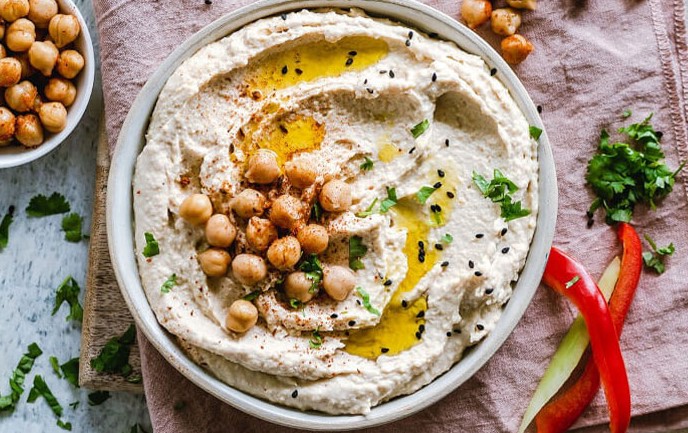Can cats eat hummus? What Happens If a Cat Eats Hummus?
As a cat owner, you may often wonder what foods are safe and healthy for your feline friend. With the rising popularity of human foods like hummus, a common question arises: Can cats eat hummus? In this detailed article, we will delve into the ingredients of hummus, its nutritional profile, and whether it is safe for your cat to consume. Follow Cat Memorial Stones !!
What is Hummus? Nutritional Profile of Hummus

Hummus is a popular Middle Eastern dip made primarily from cooked and mashed chickpeas (garbanzo beans), tahini (sesame seed paste), olive oil, lemon juice, garlic, and various spices. It is celebrated for its creamy texture and nutritious properties, often served with pita bread or vegetables. While hummus is a healthy snack for humans, we need to evaluate its suitability for our feline companions.
Hummus is rich in several nutrients, including:
- Protein: Chickpeas are a good source of plant-based protein.
- Fiber: Hummus contains dietary fiber, which is beneficial for digestive health.
- Healthy Fats: The olive oil and tahini provide monounsaturated fats, which are heart-healthy.
- Vitamins and Minerals: Hummus is a source of vitamins such as B-vitamins (like folate) and minerals like iron, magnesium, and potassium.
While these nutrients are beneficial for humans, cats have different dietary needs.
Can cats eat hummus?
While hummus might seem harmless, many ingredients in traditional hummus recipes can be dangerous or unhealthy for cats. Let’s break down the key components and their impact on your cat’s health:
- Chickpeas (Garbanzo Beans)
Chickpeas, the base ingredient of hummus, aren’t toxic to cats, but they aren’t ideal either. Cats are obligate carnivores, meaning they thrive on a diet of animal-based proteins. While a small amount of chickpeas may not cause immediate harm, they can be difficult for cats to digest. Eating too much can lead to gastrointestinal issues like gas, bloating, or diarrhea.
- Garlic
One of the most concerning ingredients in hummus for cats is garlic. Garlic is toxic to cats and can cause hemolytic anemia, a condition in which red blood cells are destroyed faster than they can be produced. Even small amounts of garlic can be harmful and lead to symptoms like lethargy, weakness, vomiting, and breathing difficulties.
>>> Click Can cats eat cheese?

- Tahini (Sesame Seeds)
While tahini isn’t inherently toxic to cats, it’s high in fats and calories. A cat’s digestive system isn’t designed to process fatty foods, and consuming tahini can lead to weight gain, pancreatitis, or other health issues related to fat consumption.
- Lemon Juice
Citrus fruits like lemons are toxic to cats. The acidity in lemon juice can cause stomach upset, vomiting, and diarrhea. Additionally, lemons contain compounds called psoralens, which are harmful to cats and can result in symptoms ranging from gastrointestinal distress to photosensitivity.
- Olive Oil
Olive oil in small amounts is not toxic to cats, and some pet owners even use it to promote healthy fur or aid in digestion. However, in the context of hummus, the added oil can contribute to excess calories and potential digestive upset.
Can cats eat red pepper hummus?
No, cats should not eat red pepper hummus.
While the main ingredients of hummus (chickpeas, tahini, olive oil) might seem harmless, red pepper hummus often contains ingredients that can be harmful to cats, such as:
- Garlic and onion: These are toxic to cats and can cause serious health problems, including anemia.
- Spices: The spiciness of red pepper can irritate a cat’s digestive system and cause discomfort.
If you’re looking for healthy treats for your cat, it’s best to stick to options specifically formulated for felines.

What Happens If a Cat Eats Hummus?
If your cat has eaten a small amount of hummus, monitor them closely for any symptoms. Common symptoms of food-related issues in cats include:
- Vomiting
- Diarrhea
- Lethargy
- Loss of appetite
- Drooling
- Breathing difficulties
If you notice any of these signs, especially after consuming hummus with garlic, it’s crucial to consult a veterinarian immediately.
Healthier Alternatives for Your Cat
Instead of offering hummus, there are other safe, healthy snacks you can share with your cat:
- Cooked Chicken: High in protein and a favorite among most cats.
- Tuna (in moderation): Cats love tuna, but it should be given sparingly due to its high mercury content.
- Cat-safe Vegetables: Some cats enjoy small amounts of cooked carrots, peas, or pumpkin.
- Commercial Cat Treats: Formulated specifically for cats, these treats offer a safe and nutritious alternative to human food.
Conclusion: Keep Hummus Out of Your Cat’s Diet
In summary, cats should not eat hummus. While the chickpeas themselves aren’t toxic, the other common ingredients like garlic, tahini, and lemon juice pose significant health risks. It’s always best to stick to a balanced, species-appropriate diet for your feline friend and avoid offering them human foods that could harm them.
>>> Read: Can Cats Eat Hamburger?
